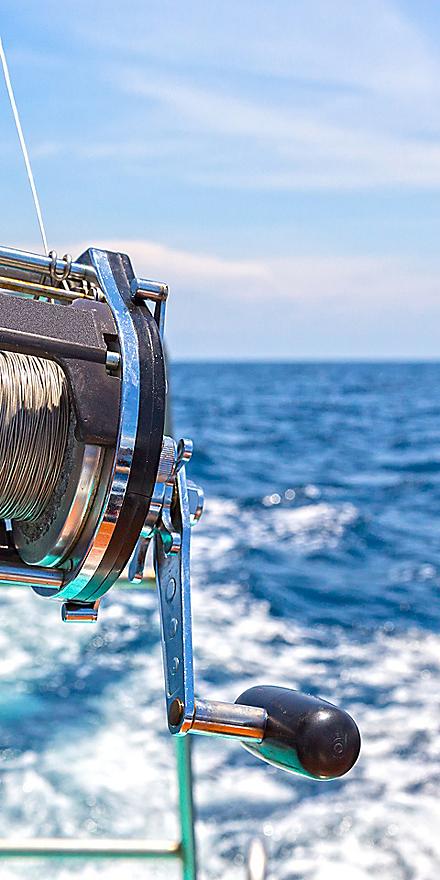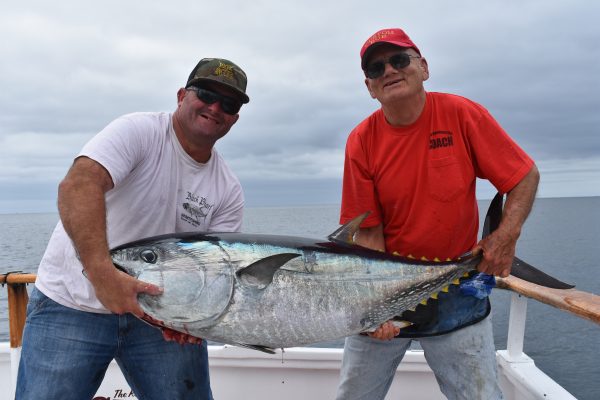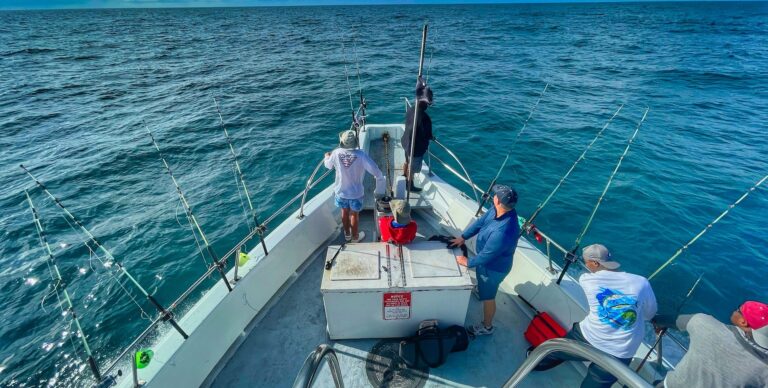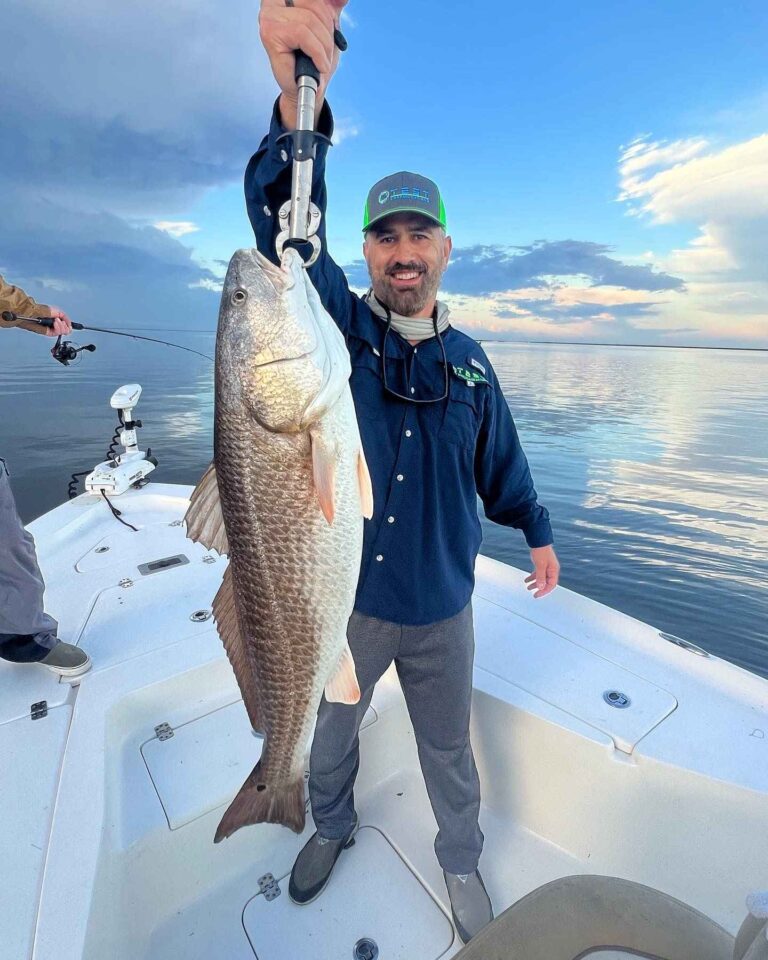Deep sea fishing can be dangerous due to the unpredictable nature of the ocean and the inherent risks involved. Engaging in this activity requires proper safety measures and caution.
Deep sea fishing is a thrilling and adventurous activity that allows individuals to explore the vast ocean and catch big game fish. However, it also comes with potential risks and dangers. The deep sea is an unpredictable and challenging environment, with rough waves and harsh weather conditions that can pose a threat to the safety of those on board.
Additionally, handling sharp hooks and heavy fishing equipment can lead to accidents and injuries if not done with care. Therefore, it is crucial for individuals engaging in deep sea fishing to prioritize safety by wearing life jackets, following proper fishing techniques, and being aware of their surroundings to minimize the risks associated with this exhilarating sport.

Credit: maritimelegalhelp.com
The Thrills And Dangers Of Deep Sea Fishing
Deep sea fishing, with its intoxicating combination of adventure, adrenaline, and the vast expanse of the open ocean, has always been a thrilling pursuit for fisherman and hobbyists alike. But as with any exhilarating venture, deep sea fishing also comes with its fair share of risks and challenges.
In this section, we will delve into the thrills that draw people to this activity, as well as the dangers that lurk beneath the surface.
Deep Sea Fishing As An Exhilarating Adventure
Deep sea fishing is more than just a hobby; it’s a way to connect with nature and challenge yourself in unimaginable ways. Here are some key points to understand about this exhilarating adventure:
- The thrill of the catch: Hooking a big game fish and wrestling it to the surface is an experience like no other. The rush of adrenaline as you battle against the fish’s strength and the uncertainty of whether you’ll be able to reel it in create an unmatched excitement.
- The serenity of the open ocean: Being out on the open ocean, surrounded by nothing but the vast expanse of water, brings a sense of serenity and peace. The feeling of isolation and being one with nature is something that cannot be replicated in any other activity.
- Exploring new territories: Deep sea fishing offers the opportunity to explore uncharted waters and discover new fishing grounds. Venturing into the unknown and discovering hidden gems adds an additional layer of excitement to the adventure.
Understanding The Risks And Challenges Involved
While deep sea fishing is undeniably thrilling, it’s crucial to acknowledge the risks and challenges that come along with it. Here are some key points to consider:
- Unpredictable weather conditions: The open ocean is notorious for unpredictable weather patterns, which can change rapidly. Storms, strong winds, and rough seas can pose significant risks to both the crew and the vessel. It’s essential to closely monitor weather forecasts and be prepared for any sudden changes.
- Navigation and seafaring skills: Deep sea fishing requires a certain level of navigation and seafaring expertise. Knowing how to read nautical charts, operate gps and radar systems, and understand buoy markers are indispensable skills for a successful fishing trip.
- Equipment failure: In the realm of deep sea fishing, equipment failure can be a daunting reality. From broken fishing lines to damaged reels or engines, any malfunction can potentially jeopardize a fishing expedition. Regular checks and maintenance of equipment are crucial to minimize the risk of failure.
- Physical exertion: Deep sea fishing can demand physical stamina and strength, especially when battling against massive game fish. Long hours spent reeling in heavy catches can strain muscles, leading to fatigue and injury. It’s important to be physically capable and take breaks when needed.
- Sea sickness: The motion of the boat in the rolling waves can cause seasickness in inexperienced individuals. It’s advisable to take preventive measures such as using medication or natural remedies to mitigate the discomfort caused by motion sickness.
Deep sea fishing presents an undeniably thrilling adventure for those willing to take on the challenges it entails. Understanding the risks involved and taking measures to mitigate them ensures a safe and enjoyable experience. So, grab your gear, muster your courage, and embark on an unforgettable journey into the depths of the sea.
Happy fishing and may your catches be abundant!
Physical Dangers: Navigating The Deep Waters
Deep sea fishing is an exhilarating experience for many fishing enthusiasts. It offers the thrill of venturing into the vast expanse of the ocean, testing your skills and reaping the rewards of a big catch. However, it’s important to acknowledge the potential dangers that come with navigating the deep waters.
In this section, we will explore the physical dangers associated with deep sea fishing and the importance of proper navigation and seamanship skills.
Powerful Ocean Currents And Unpredictable Weather Conditions
Navigating the deep waters can expose anglers to powerful ocean currents and ever-changing weather conditions. These factors can pose significant risks and must be taken into consideration before embarking on a deep sea fishing trip. Here are the key points to understand:
- Ocean currents: Strong currents can make it challenging to control the boat and maintain stability. They can sweep you away from your intended location, making it difficult to locate fishing grounds or return to shore. It’s essential to stay informed about the current patterns and plan your fishing routes accordingly.
- Unpredictable weather: Deep sea fishing takes you far from the safety of the shore, where weather conditions can change rapidly. Strong winds, heavy rainstorms, and turbulent seas are common hazards that can put you and your crew in danger. Regularly monitoring weather forecasts and heeding warnings from local authorities is vital to ensure your safety.
To ensure safety through proper navigation and seamanship skills, consider the following:
- Nautical charts and gps navigation: Prior to setting sail, it’s crucial to familiarize yourself with nautical charts and use gps navigation systems. These tools provide detailed information about the underwater topography, potential hazards, and designated fishing zones, allowing you to navigate the deep waters with confidence.
- Seamanship skills: Developing strong seamanship skills is essential for deep sea fishing. Understanding the principles of navigation, mastering boat handling techniques, and being proficient in emergency procedures can make a significant difference in challenging situations. Invest time in honing your skills or consider taking a seamanship course to enhance your knowledge and readiness on the water.
While deep sea fishing offers an exciting adventure, it’s important to acknowledge and prepare for the physical dangers associated with navigating the deep waters. Being aware of powerful ocean currents, unpredictable weather conditions, and the significance of proper navigation and seamanship skills is crucial in ensuring a safe and enjoyable deep sea fishing experience.
So, make sure you equip yourself with the knowledge, skills, and tools necessary to navigate these waters safely and confidently.
Environmental Risks: The Impact On Marine Ecosystems
Deep sea fishing is a thrilling and adventurous activity that attracts many people who are passionate about the ocean and fishing. However, it’s essential to consider the potential risks and impacts that this activity can have on the marine ecosystems.
In this section, we will explore the environmental risks associated with deep sea fishing, particularly focusing on the impact on marine ecosystems.
Overfishing And Depletion Of Fish Stocks
Overfishing has become a significant concern in deep sea fishing, putting excessive pressure on fish populations and leading to the depletion of fish stocks. Here are some key points to consider:
- The demand for seafood, coupled with advanced fishing technologies, has resulted in the excessive harvesting of fish species beyond their reproductive capacities.
- Overfishing disrupts the balance within the marine ecosystem, as it removes a significant number of fish from the food chain.
- Depleted fish stocks can have severe consequences for both commercial and recreational fishermen, as it becomes increasingly difficult to catch an adequate number of fish.
Bycatch And Non-Targeted Species Being Affected
Bycatch refers to the unintentional capture of non-targeted species during fishing operations. This can have detrimental effects on marine ecosystems. Consider the following points:
- Bycatch is a significant environmental issue in deep sea fishing, with large quantities of non-targeted species, such as dolphins, turtles, and seabirds, being caught and often discarded dead or dying.
- Bycatch can disrupt the balance of marine ecosystems by removing important species that serve as food sources or contribute to the overall health of the ecosystem.
- The use of techniques such as longline fishing and trawling increases the likelihood of encountering bycatch, as these methods cover large areas and involve indiscriminate fishing practices.
Deep sea fishing poses environmental risks that can impact marine ecosystems. Overfishing and the depletion of fish stocks disrupt the delicate balance within the ecosystem, while bycatch affects non-targeted species, leading to further ecological imbalances. It is crucial for deep sea fishing enthusiasts, fishermen, and policymakers to be aware of these risks and take necessary measures to mitigate the negative impacts on marine ecosystems.
Safety Measures: Protecting Yourself And The Environment
Deep sea fishing can be an exciting and adventurous activity, offering the thrill of reeling in big catches from the depths of the ocean. However, it’s important to remember that there are inherent risks involved in venturing out into the open sea.
To ensure a safe and enjoyable fishing experience for both yourself and the environment, it’s crucial to take necessary safety measures and promote sustainable fishing practices.
Essential Safety Equipment And Procedures
- Life jackets: Always wear a properly fitted life jacket while on the boat. In the event of an accident or emergency, a life jacket can be a lifesaver.
- Personal locator beacon (plb): This small, portable device allows you to send a distress signal to emergency services in case you find yourself in a dangerous situation. Make sure to have a plb onboard and know how to use it.
- First aid kit: Accidents happen, and having a well-stocked first aid kit can be essential in treating minor injuries until professional medical help is available.
- Radio communication: Maintain constant contact with other vessels and shore authorities via marine vhf radio. This ensures that you can quickly communicate in case of emergencies or unexpected situations.
- Weather monitoring: Stay informed about the weather conditions before and during your deep sea fishing trip. Unpredictable weather patterns can impact your safety on the water, so be prepared to adjust your plans accordingly.
- Qualified captain and crew: When booking a deep sea fishing charter, choose a reputable operator with experienced and knowledgeable staff who prioritize safety. Their expertise can make a significant difference in ensuring a safe trip.
Promoting Sustainable Fishing Practices
- Catch and release: Whenever possible, practice catch and release to minimize the impact on marine ecosystems. If you do keep fish for consumption, adhere to catch limits and only take what you need.
- Selective fishing gear: Use fishing gear that is selectively designed to target specific species, reducing the chances of catching non-targeted or protected species. This approach helps maintain a balanced ecosystem by preserving the population of vulnerable species.
- Fishing regulations and permits: Familiarize yourself with local fishing regulations and obtain the necessary permits before heading out. These rules are in place to protect fish populations and their habitats.
- Responsible waste management: Dispose of any trash, fishing lines, and other waste properly. This prevents polluting the ocean and endangering marine life.
- Respect for wildlife: Maintain a safe distance from marine animals and refrain from disturbing their natural habitat. Avoid fishing in protected areas or during critical breeding seasons to safeguard fragile ecosystems.
Remember, deep sea fishing can be an incredible experience, but it’s crucial to prioritize safety and preserve the environment. By following these essential safety measures and promoting sustainable fishing practices, you can enjoy this exhilarating activity while minimizing risks and protecting our oceans for future generations.
Health Risks: Addressing The Impact On Fishermen
Deep-sea fishing is a thrilling activity that takes fishermen on an adventure into the depths of the ocean. While it offers an exhilarating experience, it is essential to consider the potential risks involved in this extreme sport. In this section, we will delve into the health risks associated with deep-sea fishing, specifically addressing the impact on the physical well-being and mental fortitude of fishermen.
Physical Strains And Injuries Associated With Fishing Activities
Engaging in deep-sea fishing requires strength, stamina, and physical exertion. As fishermen battle the powerful forces of the ocean, they are exposed to various physical strains and injuries. Here are some key points to consider:
- Muscle strains: The repetitive motions involved in casting, reeling, and fighting against strong currents can lead to muscle strains. Over time, the continuous strain on muscles may cause discomfort or even long-term damage.
- Back and joint problems: The demanding nature of deep-sea fishing can take a toll on the back and joints. The constant bending, twisting, and pulling can lead to backaches, joint pain, and even chronic conditions such as arthritis.
- Dehydration and fatigue: Spending hours under the scorching sun and battling against the ocean’s resistance can lead to dehydration and fatigue. It is crucial for fishermen to stay hydrated and take regular breaks to prevent exhaustion.
- Cuts and abrasions: Handling sharp hooks, tools, and fishing equipment increases the risk of cuts and abrasions. In a fast-paced environment, even a momentary lapse in concentration can result in painful injuries.
Mental And Emotional Challenges Faced By Deep-Sea Fishermen
While deep-sea fishing is physically demanding, it also presents unique mental and emotional challenges. The isolation, unpredictability, and intense pressure can significantly impact a fisherman’s well-being. Here are some key points to understand:
- Isolation and loneliness: Deep-sea fishing often takes place in remote areas, far from civilization. Fishermen may experience prolonged periods of isolation and loneliness, which can affect their mental state. Lack of social interaction and the absence of everyday comforts can take a toll on their emotional well-being.
- Risk and uncertainty: Deep-sea fishing involves venturing into the vast and unpredictable ocean. The inherent risks and uncertainties associated with this activity can cause anxiety and stress. Fishermen must navigate adverse weather conditions, rough seas, and the constant unpredictability of marine life.
- Psychological resilience: The mental resilience required for deep-sea fishing is immense. Fishermen must possess the ability to cope with the challenging and often grueling aspects of the job. It involves maintaining focus and staying composed even in high-pressure situations.
- Emotional connection to the catch: Deep-sea fishermen develop a deep emotional connection with their catch. Whether it’s the thrill of a successful catch or the disappointment of a missed opportunity, the emotional rollercoaster of deep-sea fishing can be intense.
While deep-sea fishing offers an exhilarating experience, it is crucial to acknowledge and address the health risks faced by fishermen. Understanding the physical strains and injuries associated with fishing activities, as well as the mental and emotional challenges faced, can aid in promoting the overall well-being of those involved in this adventurous pursuit.
By taking necessary precautions and prioritizing self-care, deep-sea fishermen can continue to enjoy their passion while minimizing the potential risks.
Conservation Efforts: Working Towards A Sustainable Future
Initiatives To Regulate Fishing Practices And Protect Marine Life
Deep sea fishing is a thrilling and adventurous activity that offers a unique experience to fishing enthusiasts. However, it is important to ensure that this activity is carried out responsibly to prevent any negative impacts on marine life and the ocean ecosystem.
To achieve this, various initiatives have been undertaken to regulate fishing practices and protect the delicate balance of our underwater world.
Here are some key points regarding the initiatives in place:
- Fishing regulations: Governments and international organizations have implemented strict regulations and guidelines to control fishing activities in deep sea areas. These regulations include restrictions on fishing gear, catch limits, and protected zones to minimize the impact on marine life.
- Monitoring and enforcement: Local authorities and conservation organizations work diligently to monitor fishing practices and enforce compliance with regulations. This includes the use of satellite technology and patrols to detect illegal fishing activities and ensure proper adherence to sustainable fishing practices.
- Research and data collection: Scientists and marine biologists conduct extensive research to gain a thorough understanding of deep sea ecosystems and the species inhabiting them. This data is crucial in developing effective conservation strategies and assessing the impact of fishing activities on marine life.
- Promoting sustainable fishing: Responsible fishing practices are essential to preserving the ocean ecosystem. This involves using selective fishing gear and methods that minimize bycatch and unintended harm to non-target species. Adopting sustainable fishing practices not only protects marine life but also contributes to the long-term viability of the fishing industry itself.
- Collaboration and partnerships: Conservation efforts thrive on collaboration between governments, ngos, fishing communities, and other stakeholders. By working together, these groups can exchange knowledge, implement sustainable fishing practices, and create marine reserves or protected areas where marine life can flourish undisturbed.
By implementing these initiatives, it is possible to strike a balance between the excitement of deep sea fishing and the conservation of our precious marine ecosystems. Responsible fishing practices ensure that future generations will continue to enjoy the wonders of the deep sea while preserving its biodiversity and delicate balance.
Conclusion: Balancing Thrills And Risks In Deep Sea Fishing
Deep sea fishing is an extreme sport that attracts adventure seekers from all walks of life. The thrill of being out on the open water, battling against powerful fish, and the sense of accomplishment that comes with it can be incredibly exhilarating.
However, it’s important to recognize that deep sea fishing also comes with inherent risks and dangers. In this section, we’ll explore the excitement and dangers of this sport and discuss the importance of promoting responsible and sustainable practices.
Recognizing The Excitement And Dangers Of This Extreme Sport
Deep sea fishing offers a unique and thrilling experience for those who seek adventure. Here are some key points to consider:
- Adrenaline rush: The thrill of the chase and reeling in a big catch can provide an adrenaline rush like no other. It’s the perfect activity for those looking for an action-packed adventure.
- Natural beauty: Deep sea fishing offers a chance to explore the vastness of the ocean and witness breathtaking views. The serenity and beauty of the open water can be awe-inspiring.
- Variety of marine life: Deep sea fishing allows anglers to encounter a wide range of marine species, from tuna and marlin to sharks and swordfish. The opportunity to interact with these majestic creatures is truly remarkable.
- Physical challenge: Deep sea fishing requires strength, stamina, and skill. It’s a physically demanding activity that tests the limits of individuals, making it an ideal choice for those seeking a challenge.
While deep sea fishing offers thrilling experiences, it’s crucial to be aware of the potential risks and dangers associated with this extreme sport. Here are some important points to keep in mind:
- Unpredictable weather conditions: The ocean is notorious for its ever-changing weather patterns. Storms can quickly roll in, making fishing conditions dangerous. It’s essential to monitor weather forecasts and prioritize safety at all times.
- Boating accidents: Any activity involving boats carries a level of risk. Collisions, capsizing, and falling overboard are all potential dangers that deep sea fishermen should be prepared for. Wearing life jackets and following proper safety protocols can help minimize these risks.
- Equipment malfunctions: Fishing gear can fail, leading to accidents or injuries. Regular maintenance and inspections are necessary to ensure the equipment is in good working order.
- Sea sickness: The motion of the ocean can cause seasickness for some individuals. It’s important to be aware of this possibility and take necessary precautions such as taking motion sickness medication or maintaining proper balance on the boat.
Promoting Responsible And Sustainable Deep Sea Fishing Practices
To ensure the long-term viability of deep sea fishing, it’s crucial to promote responsible and sustainable practices. Here are some key points to consider:
- Catch and release: Encouraging the practice of catch and release allows for the preservation of fish populations. By releasing fish back into the water, anglers contribute to sustainable fishing practices.
- Size and bag limits: Adhering to size and bag limits helps maintain healthy fish populations. These limits are set by regulatory bodies and help prevent overfishing.
- Respect for marine life: Deep sea fishermen should treat marine life with respect and care. This includes handling fish properly, avoiding unnecessary harm, and minimizing stress on the captured fish.
- Education and awareness: Promoting education and awareness about the importance of sustainable fishing practices is essential. By understanding the impact of their actions, anglers can make informed decisions to protect the marine ecosystem.
Deep sea fishing is an exciting and thrilling sport that offers unique experiences and challenges. However, it’s important to recognize and mitigate the risks and dangers associated with it. By promoting responsible and sustainable practices, we can ensure the preservation of the marine ecosystem for future generations of deep sea fishermen to enjoy.
Conclusion
To wrap up, deep sea fishing can be an exhilarating and rewarding experience for enthusiasts. While there are inherent risks involved, proper preparation and adherence to safety guidelines can significantly mitigate these dangers. Being aware of weather conditions, having the necessary safety equipment, and being knowledgeable about potential marine hazards are critical steps in ensuring a safe fishing trip.
Additionally, it is essential to choose an experienced and licensed guide or charter service who prioritizes safety. The thrill of the catch, the beauty of the open sea, and the sense of adventure make deep sea fishing an unforgettable activity for many.
By approaching it with caution and being responsible, you can enjoy the incredible world of deep sea fishing while minimizing the risks. So, if you’re passionate about fishing and looking to explore the depths of the ocean, don’t let the potential dangers discourage you, but rather use them as motivation to prepare and enjoy this unique and exciting experience.





